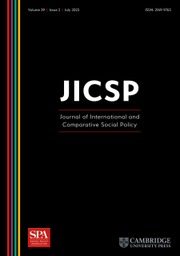Crossref Citations
This article has been cited by the following publications. This list is generated based on data provided by
Crossref.
Andy Neely, Dr Rick Edgeman, Prof Jacob Eskildsen, Prof
and
Edgeman, Rick
2015.
Wicked global challenges: sustainability in the enterprise crosshairs.
Measuring Business Excellence,
Vol. 19,
Issue. 1,
p.
13.
Copestake, James
2015.
Whither development studies? Reflections on its relationship with social policy.
Journal of International and Comparative Social Policy,
Vol. 31,
Issue. 2,
p.
100.
Madhav Sinha, Dr
Edgeman, Rick L.
and
Wu, Zhaohui
2015.
Climate change and social strain: strategic enterprise responses.
The TQM Journal,
Vol. 27,
Issue. 4,
p.
450.
Gough, Ian
2016.
Welfare states and environmental states: a comparative analysis.
Environmental Politics,
Vol. 25,
Issue. 1,
p.
24.
Büchs, Milena
and
Koch, Max
2017.
Postgrowth and Wellbeing.
p.
103.
Ma, Li
Wang, Liang
Wu, Kuo-Jui
and
Tseng, Ming-Lang
2018.
Assessing co-benefit barriers among stakeholders in Chinese construction industry.
Resources, Conservation and Recycling,
Vol. 137,
Issue. ,
p.
101.
Jakobsson, Niklas
Muttarak, Raya
and
Schoyen, Mi Ah
2018.
Dividing the pie in the eco-social state: Exploring the relationship between public support for environmental and welfare policies.
Environment and Planning C: Politics and Space,
Vol. 36,
Issue. 2,
p.
313.
Singer-Brodowski, Mandy
Brock, Antje
Etzkorn, Nadine
and
Otte, Insa
2019.
Monitoring of education for sustainable development in Germany – insights from early childhood education, school and higher education.
Environmental Education Research,
Vol. 25,
Issue. 4,
p.
492.
Gabriel, Cle-Anne
and
Bond, Carol
2019.
Need, Entitlement and Desert: A Distributive Justice Framework for Consumption Degrowth.
Ecological Economics,
Vol. 156,
Issue. ,
p.
327.
Hoffmann, Roman
and
Muttarak, Raya
2020.
Greening through schooling: understanding the link between education and pro-environmental behavior in the Philippines.
Environmental Research Letters,
Vol. 15,
Issue. 1,
p.
014009.
Philp, George
and
Cohen, Alice
2020.
Municipal climate change adaptation and mitigation: from planning to action in Nova Scotia.
Journal of Environmental Planning and Management,
Vol. 63,
Issue. 11,
p.
1927.
Stamm, Ingo
Matthies, Aila-Leena
Hirvilammi, Tuuli
and
Närhi, Kati
2020.
Combining labour market and unemployment policies with environmental sustainability? A cross-national study on ecosocial innovations.
Journal of International and Comparative Social Policy,
Vol. 36,
Issue. 1,
p.
42.
Fritz, Martin
and
Bohnenberger, Katharina
2020.
Sozialpolitik for Future.
Forschungsjournal Soziale Bewegungen,
Vol. 33,
Issue. 1,
p.
269.
Bieszk-Stolorz, Beata
and
Dmytrów, Krzysztof
2020.
Influence of Accession of the Visegrad Group Countries to the EU on the Situation in Their Labour Markets.
Sustainability,
Vol. 12,
Issue. 16,
p.
6694.
Bohnenberger, Katharina
and
Fritz, Martin
2021.
Klimagerechtigkeit, Diversität und Nachhaltige Sozialpolitik.
ZDfm – Zeitschrift für Diversitätsforschung und -management,
Vol. 6,
Issue. 1,
p.
53.
Watkin, Amy‐Louise
2023.
Countering online terrorist content: A social regulation approach.
Policy & Internet,
Vol. 15,
Issue. 4,
p.
528.
Järvelä, Marja
2023.
Dimensions of cultural sustainability—Local adaptation, adaptive capacity and social resilience.
Frontiers in Political Science,
Vol. 5,
Issue. ,
Hasanaj, Valon
2023.
The shift towards an eco-welfare state: growing stronger together.
Journal of International and Comparative Social Policy,
Vol. 39,
Issue. 1,
p.
42.
Larasati, Zita Wahyu
Yuda, Tauchid Komara
and
Syafa'at, Akbarian Rifki
2023.
Digital welfare state and problem arising: an exploration and future research agenda.
International Journal of Sociology and Social Policy,
Vol. 43,
Issue. 5/6,
p.
537.
Berthe, Alexandre
and
Turquet, Pascale
2023.
Handbook of the Anthropocene.
p.
615.


